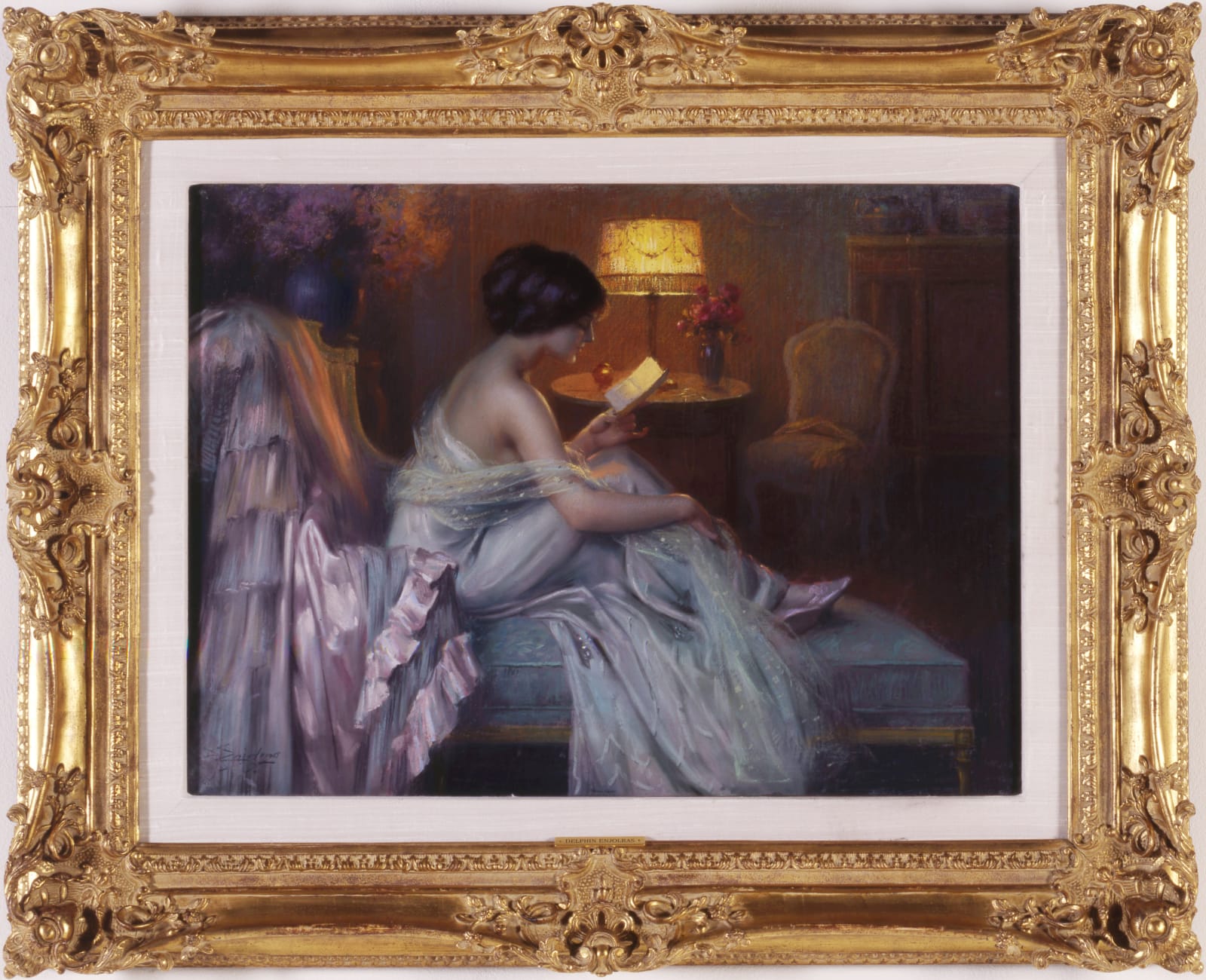Delphin Enjolras (1857-1945) 1857-1945
Delphin Enjolras (1857-1945)
“La Lecture au Clair de la Lampe”
Pastel on paper, signed D Enjolras
54 x 73 cm.
Delphin Enjolras mastered the medium of pastel to perfection though he was equally adept working in watercolour, gouache and oil. Known for his dazzling studies of beautiful young women engaged in domestic activities, he also portrayed a number of Orientalist subjects, genre scenes and society portraits. In addition Enjolras painted some city views as well as beautiful landscapes such as ‘La Provinciale’ at the Musée Calvet d’Avignon and ‘Le Donjon de Polignac’ at the Musée de Le Puy-en-Velay.
Enjolras was born on 13th May 1857 in the historic town of Coucouron in the Ardèche. His formal artistic training began in Paris at the Ecole des Beaux-Arts under the esteemed Salon painter Jean-Léon Gérôme (1824-1904) whose highly finished academic style and Oriental scenes enjoyed great popularity and set a fashion for others to follow. Enjolras also studied with Pascal Adolphe Jean Dagnan-Bouveret (1852-1929) and Gustave Claude Etienne Courtois (1853-1923) and is recorded as having furthered his artistic education at the Ecole de Dessin in Paris under Gaston Gérard (b. 1859). Having made his debut at the Société des Artistes Français in 1889 he was elected a member in 1901 and continued to show works with the Société up until 1909.
His early style owed much to his training under Gérôme and was expressed by a number of intimate portrayals of female models often lying in abandon on a couch within an Eastern interior. However the majority of his works in pastel, exhibited at the Salon from 1890 tended to focus on more contemporary bourgeois settings of which the present work is typical. As here, the artist often placed the same beautiful dark haired model in a darkened interior, illuminated by lamp light in her boudoir. The model, like many others is engaged in reading a letter, while at other times she reads a book or may be sewing, dressing, arranging flowers or engaged in similar domestic pursuits. Enjolras used light to create atmosphere, often highlighting the figure’s exposed skin and silken diaphanous drapery. Sometimes he placed his figures against an open window or on a moonlight terrace hung with lanterns. Less frequently he portrayed his figures en plein air, such as his oil ‘Baigneuses aux Cygnes’, portraying two semi-nude women beside swans and water (illustrated in G. Schurr and P. Cabanne, “Dictionnaire des Petits Maîtres de la Peinture”, 2003).
Enjolras began working regularly in pastels from the later decade of the nineteenth century onward and as a master of the female form became a popular society pastel portraitist, of which his portrait of Mrs Constance Cambell (private collection) is a fine example. In contrast he executed a very interesting self-portrait in oils painted on a wooden paint-smudged palette (sold New York 1993). Unlike most of his works it was dated and inscribed “D. Enjolras/ Amical Souvenir/ a Pascal/ 1921”, the dedication to Pascal possibly being to his friend Pascal Dagnan-Bouveret. The image shows a slight figure, with dark receding hair, beard and moustache wearing an artist’s smock over collar and tie and above all portrays an amiable character whose apparent vibrant energy was so cleverly expressed in the present pastel as well as many of his other works.
